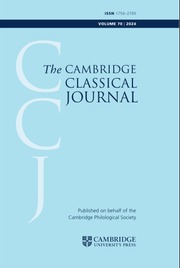Article contents
Hellenistic philosophers on Phaedrus 229b–30a
Published online by Cambridge University Press: 28 February 2013
Extract
At M. 7.433 the sceptic Sextus Empiricus infers from the statement that the early Stoics did not profess themselves to be sages that ‘Cleanthes did not know whether he was a human being or a beast more complex than Typhon.’ Since in two other passages, at M. 7.264 and PH 2.22, Sextus ascribes (variations upon) this confession of ignorance to Socrates rather than Cleanthes, whom Sextus otherwise obviously presents as one of his dogmatic adversaries, it has been alleged that the reference to one of the heads of the Stoic school must simply have been a ‘wilful misreading’ on Sextus' behalf. As I hope to show, there are good reasons for Sextus to refer to a Stoic here, or rather even better reasons for a Stoic to have brought up this reference himself.
As has been picked up well in modern scholarship, Sextus' inference at M. 7.433 (as in the other two passages) ultimately refers back to the beginning of the Phaedrus, at 229e–30a, which contains an image (or perhaps even self-portrait) of Socrates.
- Type
- Research Article
- Information
- Copyright
- Copyright © The Author(s). Published online by Cambridge University Press 2008
References
WORKS CITED
- 2
- Cited by




